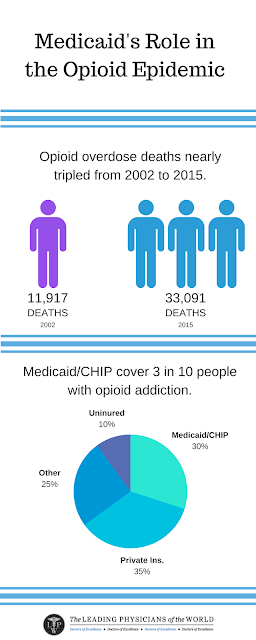What is Medicaid Role?
Medicaid,
the nation’s public health insurance program for low-income people, now covers
nearly 60 million Americans, including many working families, as well as many
of the poorest and most fragile individuals in the US society. Medicaid is the
largest source of financing for nursing home and community-based long-term
care, and it provides essential funding for the safety-net delivery system on
which many Americans rely. Most Medicaid enrollees would be uninsured without
the program. Medicaid is a counter-cyclical program; during the economic
recession, it expanded as intended, assisting millions of people affected by
loss of employment and health coverage and declining income, but also straining
state budgets.
A Growing Program
In 1965,
the United States enacted Medicare for the elderly – and also Medicaid to help
pay for health care for very poor children, the disabled, and seniors. At
first, the types of people eligible for Medicaid were those receiving cash
welfare assistance. But as the years went by, Medicaid benefits were extended
to many low-income workers. Medicaid has also expanded to cover additional
services, such as nursing home care for elderly people who exhaust family
resources. Grandmothers and grandfathers in many middle class families end up
using benefits.
From the
start, Medicaid was popular with a majority of Americans, and public affection
for it has only grown. During the budget crisis of the summer of 2011when
citizens were asked whether they supported cuts in Medicaid as a way to reduce
the federal budget deficit, 72% of the public said they were opposed to cuts,
and 54% were strongly opposed. Most Americans want to help the poor, yet
Medicaid also touches people and families who are not desperately poor. A
recent Kaiser Family Fund Survey found that 51% of Americans have some personal
connection to the Medicaid program; a fifth have received benefits personally
at some time, and 31% have a family member or close friend that is covered by
the program.
What is Medicaid’s role?
Medicaid
has assisted millions affected by the recession, stemming greater increases in
the number of uninsured. In recent years, Medicaid has filled gaps in coverage,
especially for children, left by steadily eroding job-based coverage and
worsened by the impact of the recession. While the uninsured rate among adults
has continued to rise, Medicaid and CHIP have provided a safety-net of coverage
for children. Indeed, nearly 600,000 fewer children were uninsured in 2009 than
in 2007, as 4.6 million children gained Medicaid or CHIP coverage.
Medicaid is
the largest source of funding for safety-net providers and the dominant payer
for long-term care. Medicaid is the largest source of funding for health
centers and public hospitals that serve the poor and uninsured, often in
underserved areas. Children’s hospitals also rely heavily on Medicaid payment.
Seven in 10 people living in nursing homes are covered by Medicaid. The program
also provides over a quarter of all funding for mental health care.
Medicaid is
a major item in federal and state budgets. Medicaid spending per person has
been growing more slowly than other health care costs. Medicaid is the
third-largest domestic program in the federal budget after Social Security and
Medicare, and accounts for 8% of federal spending. It is the second largest
program in most states’ budgets after elementary and secondary education, with
states spending about 16% of their own funds on the program on average.
The use of
managed care is not the only approach to achieving high performance in the
delivery of Medicaid services. Yet, activity and interest in Medicaid managed
care are high and likely to increase with the expansion of Medicaid to cover
more low-income adults in many states under the Affordable Care Act. Therefore,
certain policy and operational changes, as well as ongoing program monitoring
and evaluation, are recommended to promote patient-centered, coordinated care.




Comments
Post a Comment